/Digital Icarus
How I lost myself chasing a name
from 07/24/2025, by uni — 22m read
"Never regret thy fall, O Icarus of the fearless flight, For the greatest tragedy of them all, Is never to feel the burning light." - Oscar Wilde
The Name and the Game
In the early 2010s, a cultural shift began to solidify around the concept of digital identity. As online platforms matured, usernames, once regarded as ephemeral or merely functional, began to acquire symbolic and economic value. A short, clean handle became a signal of early adoption, authenticity, or social capital. The phenomenon was particularly pronounced on platforms such as Twitter, Instagram, and Steam, where usernames doubled as identity markers and extensions of the self. Possession of a rare or original username began to represent something much larger than the name itself.
Within this emerging economy, communities like OGUsers carved out a niche as black markets for digital identity. There, usernames are bought, sold, stolen, and hoarded with the same intensity as real-world luxury goods. These platforms are morally ambiguous at best, outright malicious at worst, but they thrive because of a simple truth: scarcity breeds value. And in the realm of usernames, scarcity is absolute. Once a handle is claimed, it is gone. Most platforms do not recycle names. As a result, the ownership of certain handles began to represent not only status but the illusion of permanence in a digital world defined by impermanence.
OGUsers itself has mirrored the very nature of the names it traffics in. Like Rome, it has risen, fallen, been burned to the ground, and rebuilt from the ashes more times than anyone can count. Each collapse births a new empire, slightly more unhinged than the last, but always centered on the same belief: that identity, when rare enough, is worth any price.
I became involved in this world as a high school student, originally not through direct participation in handle trading but through similar activities: selling high-ranked Counter-Strike accounts to players seeking shortcuts to prestige. My clients were often after ego boosts, not skill development. I sold Legendary Eagle Master and Supreme accounts, Faceit Level 8s and 9s, often for Bitcoin. These actions were, of course, clear violations of the platform's Terms of Service, but within the ecosystem I inhabited, rules were negotiable. Enforcement felt distant, abstract.
Over time, my fascination with account status began to expand. I discovered that among the most prized assets were not just high-skill accounts, but aged accounts, those created in Steam's earliest days, carrying low-digit user IDs. Steam IDs are assigned sequentially, meaning that the lower the number, the older the account. These identifiers became de facto proxies for seniority, authenticity, and exclusivity. A user with a five-digit STEAM_0:0:48643 Steam ID held symbolic weight over someone with a nine-digit STEAM_0:1:514678780 ID. The cut-off between eight and nine digits occurred in October 2014. After that, rarity became increasingly inaccessible.
My interest soon pivoted to a single question: how could someone like me, without access to insider tools or capital, obtain a low-digit account?
The answer, I found, was both technical and opportunistic. It required knowledge of system behavior, a willingness to exploit outdated protocols, and, above all, luck. One popular method involved scanning ranges of Steam IDs for accounts that had never set up a community profile. These dormant accounts often retained their original profile names, which in earlier versions of Steam were auto-filled using the prefix of the email used at registration. If an account's profile name was username, for example, it was likely tied to [email protected] or a similar address.
Unlike usernames, which Steam never releases, early email providers such as Hotmail, Yahoo, and AOL routinely recycled or deleted inactive email accounts. This created a narrow and vanishingly rare opportunity: if the original Steam account had remained untouched and the associated email had lapsed into deletion, it could be recreated. Doing so provided a foothold, access to an email that Steam still recognized as valid for account recovery.
The process was complex, full of seemingly random steps. After recreating the dormant email, one would register a new Steam account with it. Steam's recovery page, in some cases, would reveal both the new and old accounts tied to that address. But the true exploit came through Big Picture Mode, Steam's console-like UI. By launching the password recovery flow through this interface and entering the original Steam login (not the email), one could trigger a recovery email to the reactivated address. From there, account reset and ownership transfer were possible.
I can't recall where I first learned this method. Likely from half-translated and abandoned OGU threads. What mattered is that it worked. I successfully recovered several aged accounts using this approach. It was a game, albeit one with high stakes and unclear ethics. But I didn't view it that way. At the time, it felt like solving puzzles no one else could.
I wasn't interested in reselling these accounts. I wasn't chasing volume. I was chasing something personal.
I wanted a name.
Not just any name, a name that literally represented me. A name that was clean, simple, and rare. A name that signified I had reached into a closed system and claimed something permanent. That name was /id/uni.
Transfer of Power
 Figure 1: Vanity URL history provided by SteamID.uk
Figure 1: Vanity URL history provided by SteamID.uk
The exact lineage of /id/uni is unclear. Like many digital artifacts that predate widespread archival practices, its early ownership is lost to Steam history. What is known is that, at some point in the mid-2010s, the name was attached to a Steam trading bot, part of an automated service designed to speed up Steam level progression by exchanging trading cards. These services were and remain a fixture of the Steam ecosystem, operating on the edge of legitimacy. Steam levels, while functionally insignificant, represent another layer of digital hierarchy; higher levels signal time spent, money invested, and therefore, status acquired.
At the time, I had no means of acquiring the handle. The account was just another trading bot, indistinct in function but exceptional in name. I recall even trading a few Counter-Strike: Global Offensive keys with this bot under the name Uni Level Up SetsFast.com to level up my own profile. It was frustrating to see the name I wanted tied to something so impersonal, so utilitarian. I monitored the account loosely, waiting for a moment of vulnerability.
That moment came unexpectedly. The trading bot was community banned.
The reasons were never clear. Card trading bots remain active today, and no mass bans occurred around the same time. It is possible the account was used for other illicit purposes, or simply flagged in error. What mattered was that the ban made the name vulnerable, but only briefly. I checked the profile daily, watching for any change in its configuration. One day, I noticed the /id/uni had been removed. The owner, whoever they were, had transferred the name.
It was a strategic move. Once a Steam account is community banned, users lose the ability to modify most profile elements, including the vanity URL. The owner must have anticipated the ban and switched the name to another account in advance. What surprised me was where they moved it: a low-digit account.
This decision made little sense on the surface. Low-digit accounts are extremely valuable in their own right. To use one as a temporary holding space for a high-demand name was risky and, in many ways, counterintuitive. A newly created "burner" account would have been safer. The decision suggested one of two things: either the person in control of the transfer didn't fully understand the value of the receiving account, or they didn't truly own it.
I turned to SteamID.uk, a third-party archival tool that logs public-facing account metadata. The account history showed an alias: shanghikid06. I immediately suspected a dormant email address and cycled through Hotmail and AOL before confirming it on Yahoo. I claimed it.
This alone confirmed that the person who had most recently accessed the account could not have been the original owner. If the email had been available for me to recreate, then whoever used it last was either acting through unauthorized access or had no interest in maintaining permanent control. The situation was murky. Steam's IP logs suggested the account had been accessed from Russia. The username, in contrast, implied a different geography entirely. The trail didn't align.
What intrigued me most was the timing. The transfer of the /id/ occurred just before the community ban on the trading bot account. It was an action taken in the final hour, a preemptive rescue. But it only succeeded in preserving the name, not liberating it. The low-digit account it was transferred to was community banned as well. It's possible the person involved was engaging in other account activity that eventually led to both accounts being banned.1
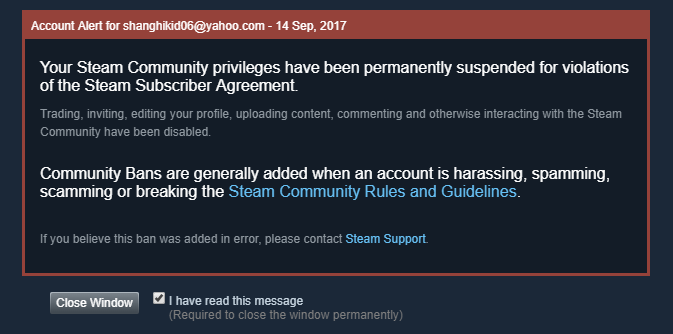 Figure 2: Community Ban shown on
Figure 2: Community Ban shown on shanghikid06
The end result was paradoxical. I had successfully gained access to the account holding /id/uni. I controlled the email. I could log in. But the name itself was untouchable. The community ban rendered it static. The very thing I had sought was now mine in form but not in function. I could see the name in my profile URL. I could load the account. But I could not move it, transfer it, or apply it to my own identity.
It was a textbook case of incomplete control. I had the key, but the door had rusted shut.
There was one final mechanism available: Steam's account deletion process. I submitted a support request under my assumed ownership, solely providing original email access. My hope was that, by permanently deleting the banned account, the name would be released into the pool of unclaimed vanity URLs. Steam's deletion policy operates on a 30-day delay. Once confirmed, I waited.
A countdown had begun.
Wings of Wax
Once the 30-day deletion window elapsed, I claimed /id/uni and transferred it to my primary account, a five-digit Steam ID that already carried a degree of rarity and historical weight. The result was a kind of symbolic convergence: an aged account paired with the handle I had pursued for years. This was not simply a cosmetic change. It represented the culmination of an identity, a consolidation of status and control.
The psychological effect was immediate and unambiguous. I was elated. In that moment, I felt completely untouchable. I had successfully bypassed Steam's internal systems, manipulated account recovery protocols, forged identities, and emerged with something that few others had, a clean, timeless name bound to a legacy account. It validated every effort that had come before. More than that, it validated me.
The handle became a point of pride and performance. I no longer engaged in the underground economy of account flipping or username hunting. That phase of my life was, temporarily, complete. My in-game presence now carried a weight it never had before. Friends, strangers, and random lobby members would comment on it. I knew exactly what it signaled: rarity, authority, permanence. For the first time, I felt that my online identity was whole.
But this was not a sustainable equilibrium.
The control I had achieved slowly began to reshape how I viewed myself. I grew possessive, not only of the name but of the persona it reinforced. I developed a quiet superiority, a sense that I had outsmarted the systems others were bound by. In hindsight, I can recognize this shift as a form of ego inflation. The /id/ became a mirror I could not look away from. In mythological terms, I had become my own Narcissus, captivated by the image I had constructed. But as with all mythic arcs, ascension invites collapse.
The loss occurred in late 2019, roughly a year after I had first acquired /id/uni. It was an ordinary day. I returned home from school and followed my usual afternoon routine: warm up with Aimbotz, then join a deathmatch warmupserver server. Mid-session, I was unexpectedly kicked. A message from Steam Support followed: "This account may have been accessed by someone else." In an instant, everything I had constructed unraveled.
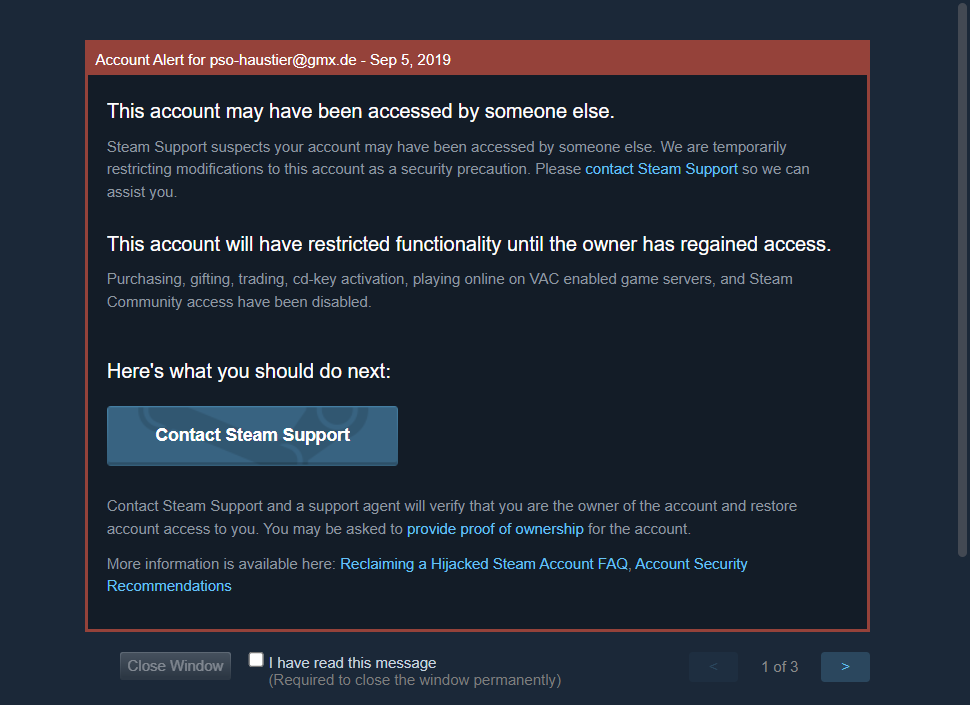 Figure 3: Community Ban shown on my personal account
Figure 3: Community Ban shown on my personal account
The emotional response was immediate. My body recognized what had happened before my mind could catch up. My stomach sank. I felt nauseous, cold, and briefly panicked. I had lived in a digital world defined by control, and now that control had been severed. I submitted a support request immediately, armed with full knowledge of the recovery process. I provided the account's original email (now mine), the phone number, and payment history. Every data point aligned.
Steam's response came the following day. They required one final piece of verification: the original Half-Life CD key used to create the account in 2003.
This request was, from my perspective, unreasonable. Even if I had been the legitimate original owner, it was unlikely that I would still possess a physical game key from over fifteen years prior. Moreover, Valve had long since migrated away from local CD key storage. Where such keys had once been retrievable through the Windows registry (for example HKEY_CURRENT_USER/Software/Valve/Settings/Key), they were now stored only server-side, inaccessible to the user. I had nothing to offer them.
Still, I refused to accept defeat. Over the next several months, I submitted repeated support tickets, each time with slight variations, hoping to encounter a more lenient support agent. All were denied. The situation became existential. I had built my sense of digital identity around this name. Its sudden unavailability left a void.
It was then that I decided to fabricate a solution.
If the CD key was the barrier, perhaps I could recreate it, not digitally, but physically. I searched for high-resolution scans of Half-Life: Generation, a European-exclusive release that bundled several of Valve's early titles. The packaging aligned with the narrative I was constructing; the account in question had originally been tied to a German email address. Using Photoshop, I aged the image, adding artificial wear, slight color degradation, and texture. I located a legitimate key from a forum archive and embedded it into the design using a dot-matrix font consistent with physical printings from the era. I printed the result on high-quality paper, trimmed it to fit, and placed it in a jewel case. The product was, by most visual standards, indistinguishable from the original.
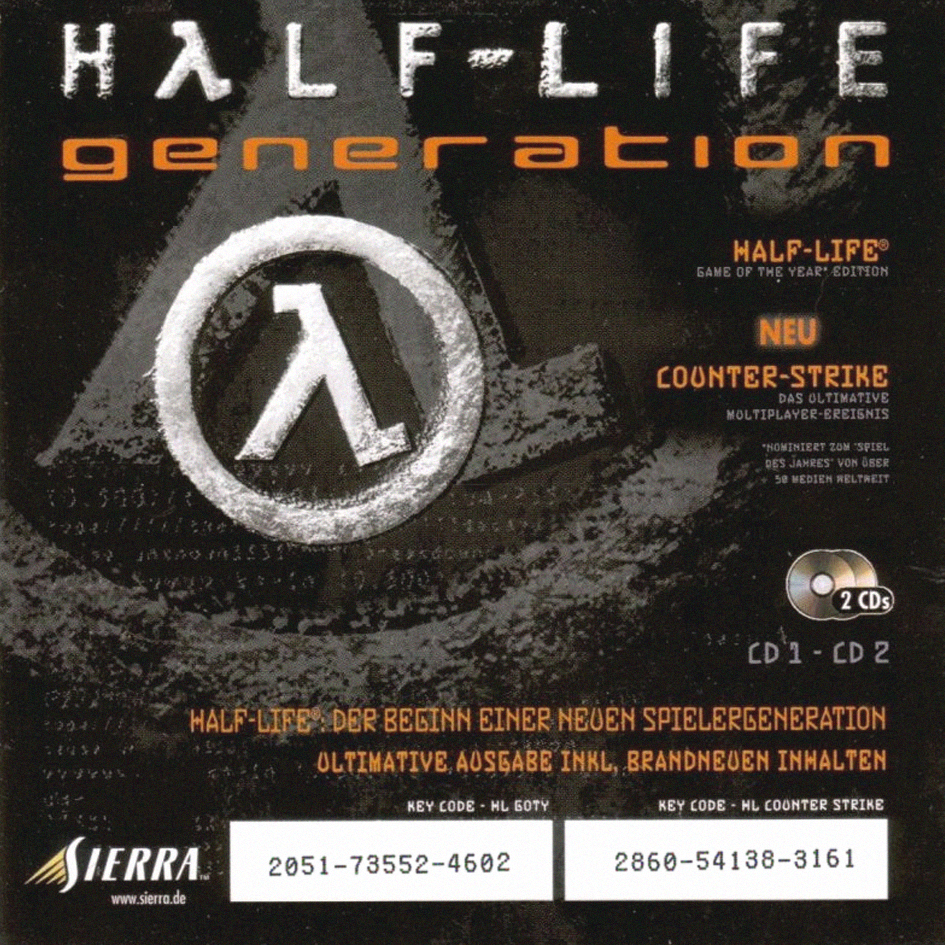 Figure 4: Photoshopped Half-Life: Generation CD cover
Figure 4: Photoshopped Half-Life: Generation CD cover
The narrative I submitted to Steam Support was similarly detailed. I claimed to have created the account while studying abroad in Germany in 2003, then relocated to the United States. I explained that I had returned to Europe for work and wished to delete the old account for privacy reasons under GDPR. The story was plausible. The key was convincingly forged. The intention was clear.
Steam denied the request.
They informed me that the CD key I submitted did not match the one on record. No further action could be taken.
In truth, I had anticipated this outcome. The key was not real. It could not possibly match. But I had hoped that the context, the polish, and the dedication might persuade someone on the other end of the support ticket to let it pass. It did not. The system, for once, held firm.
And just like that, I was left with nothing but the remnants of an identity I could no longer reach. The name was frozen. The account was inaccessible. What had once been a symbol of control was now a symbol of loss.
 Figure 5: Screenshot of my personal account on the day of the ban (9/5/19)
Figure 5: Screenshot of my personal account on the day of the ban (9/5/19)
The Return
In the six years since I lost access to /id/uni, my life moved forward. I switched primary accounts. I stopped participating in the account trade entirely. I pursued other goals, won collegiate Counter-Strike tournaments, and completed my degree in Computer Science. I created new friends and new anchors. But the name remained a presence in the background, not lost, just suspended in time.
Each year, I submitted a Steam support ticket. Not out of hope, exactly, but out of habit. It became a ritual, something I performed to verify that the system still worked as it always had. Each request was denied. Nothing changed. And yet, each submission felt necessary, as if repeating the act maintained some fragile tether between me and the name I had once claimed.
I found consolation in the fact that no one else could access the account either. I had not lost /id/uni in the traditional sense. It had not been taken or stolen. It had simply become unreachable, like a trophy encased in ice. The name was mine in spirit, even if not in practice. Sometimes I wondered what would happen in the far-off future, when the Unix timestamp reached its maximum value on January 19, 2038. Perhaps some small rupture in the system would occur, and the name might fall through the cracks. It was a comforting thought, however completely irrational.
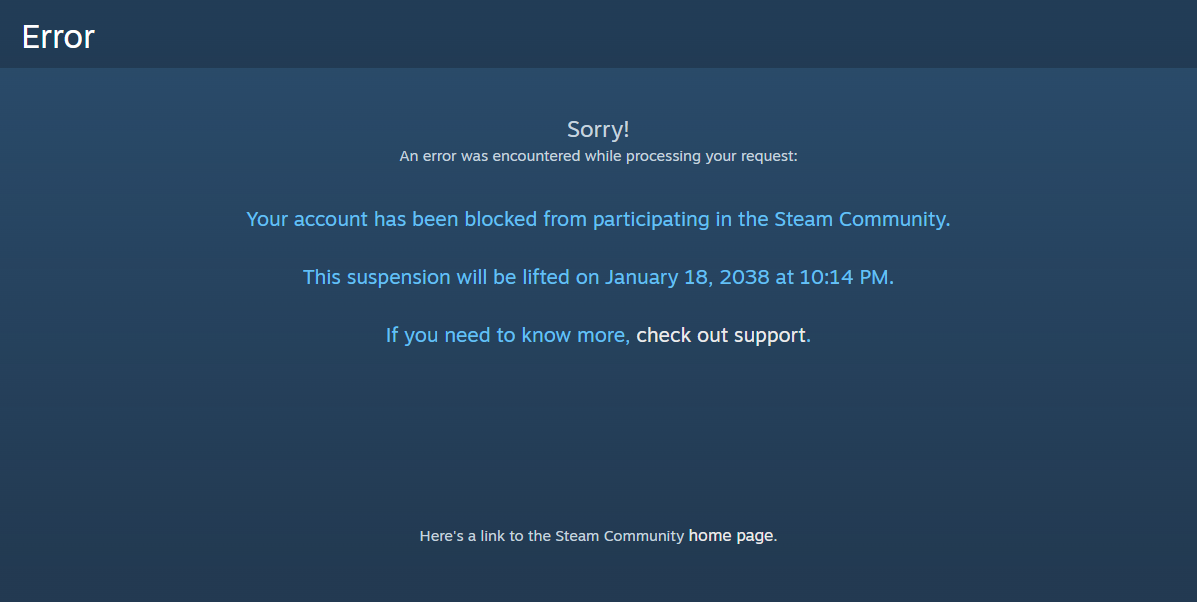 Figure 6: Screenshot of ban's Year 2038 problem
Figure 6: Screenshot of ban's Year 2038 problem
A few weeks ago, I returned to OGUsers for the first time in a while. I no longer had any active interest in acquiring usernames, but occasionally I browsed the listings out of habit or curiosity. One caught my attention. A seller was offering a batch of Last.fm usernames, one of which was particularly clean: Bird. I had no personal use for it, but it reminded me of a close friend, someone who had listened to the story of /id/uni unfold over years. He knew what the name meant, even if he wasn't immersed in the same subculture. I purchased it and sent it to him without ceremony.
He was grateful. We exchanged a few messages, caught up about our summers, and joked about the absurdity of the OGUsers community. As we talked, something compelled me to submit one more Steam support ticket. I didn't think about it. I didn't overplan. I simply wrote the request and moved on with my day.
Only three hours later, Steam responded. They approved the account deletion request.
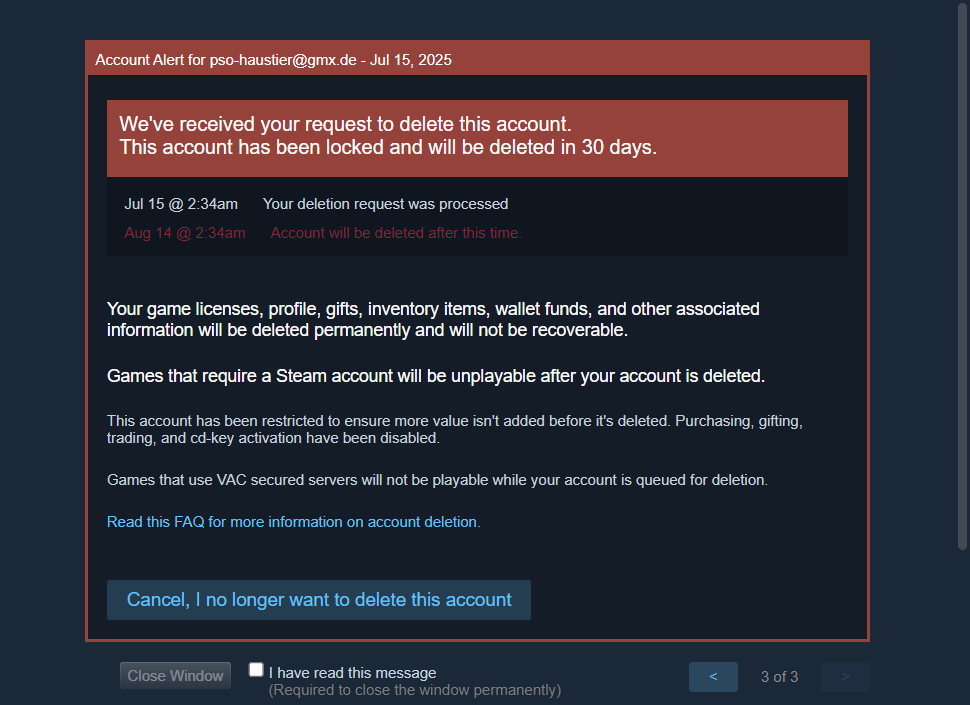 Figure 6: Personal account proceeding with deletion (7/15/25)
Figure 6: Personal account proceeding with deletion (7/15/25)
There was no change in the form. No added context. No new documentation. It was identical to the ones I had submitted in years prior. This time, it was accepted. I don't know why. Perhaps the policy changed. Perhaps a support agent took a chance. Perhaps, after all this time, the randomness of the system finally worked in my favor.
I'd love to say I didn't celebrate, that I was past it, above it somehow. But the truth is I did, more than I'd like to admit. After years of failed attempts, something finally cracked open. As before, account deletions take thirty days to process. At the time of writing, I have three weeks remaining.
There's a quiet symmetry in how this has unfolded. When I first acquired /id/uni, I viewed it as a symbol of mastery. It was the culmination of years spent learning, manipulating, and exploiting. The name felt like proof of control. But looking back, it wasn't control I had achieved, it was obsession, temporarily rewarded. Owning the name had inflated my sense of power. Losing it had exposed how little of that power was real.
I've come to understand that this entire narrative, acquisition, collapse, recovery, is not simply about a username. It is about control. And the inevitable overreach of it. The digital world tempts us with the illusion of ownership. We invest ourselves in handles, skins, stats, and networks, as if they will last. But in truth, none of it is truly ours. Platforms govern identity. Corporations guard access. And names, no matter how rare, are ultimately leased, never owned.
What does it mean to reclaim /id/uni?
On paper, it means little. A thirty-day countdown and a string of characters soon to be mine again. But in spirit, it is the culmination of something murkier: a theft reversed, a symbol retrieved, a desire momentarily satisfied.
And yet, the contradiction lingers. I did not recover something I had lost. I stole something back that was never truly mine. It is a strange victory, if one can call it that. Is it something to be proud of? Or simply the only way I knew to close the loop?
Perhaps the truth is that there was no rightful owner. Only someone who wanted it more.
I chased a name across years and systems because it felt like it defined me. And maybe it still does. I wish I could say otherwise, that time had dulled its meaning or that I had matured past such vanity. But I would not have gone to these lengths: legal, ethical, psychological, if it meant nothing. It meant everything. Enough to scheme, fabricate, persist. Enough to write this story.
In that sense, the myth isn't Icarus, or not only Icarus. His tale is one of daring and consequence, yes, but it ends in clarity. Mine does not. If anything, this is the myth of Narcissus, a boy drawn to his reflection, unsure if the thing he sees is truly his, or merely the illusion of something complete. I constructed an image of myself and mistook it for the self. A handle became a mirror.
Identity is fragile. We build ourselves around symbols and forget they can vanish. One day you're in control; the next, you're clawing for proof that you ever mattered. I flew. I fell. And in the end, I looped back, not to the place I started, but to the question that drove the journey in the first place: Who am I, without this name?
I don't have the answer. But I know this: I cared. More than I wanted to. Enough to keep flying even after the wings had burned.
Epilogue
Will be written once /id/uni is transferred to my personal account
-
It seems that the owner of the original Unibot account was trade banned according to SteamRep. The exact reasoning cannot be seen though, as SteamRep's forum has been permanently shut down. Flubble Dubble (the owner) is said to have committed a Steam Wallet Scam using the Unibot accounts, which caused the chain reaction of community bans. ↩